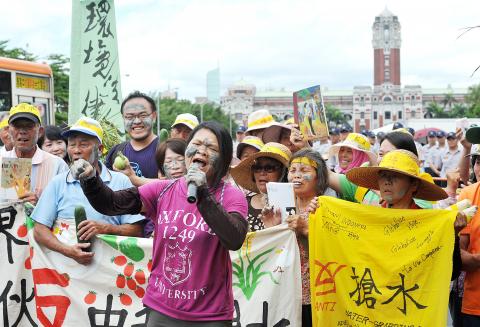Brandishing rice stems, guavas, cucumbers and other crops, close to 100 farmers from Changhua County yesterday gathered on Ketagalan Boulevard in Taipei to protest against a water diversion construction project in the fourth-phase expansion of the Central Taiwan Science Park.
“The science park is robbing us of water. Stop the construction at once,” the farmers shouted.
“We cannot stand the increase in electricity prices. We are very hungry,” they said, adding that as irrigation water is diverted from farmers to supply the science park, farmers would face even more difficult conditions.

Photo: Chien Jung-fong, Taipei Times
“We are not against the science park per se. We are against the water being stolen from us,” farmers from the county’s Sijhou Township (溪洲) said.
“How are we farmers supposed to survive if the science park steals our irrigation water?” they said.
Some artists and writers also joined the farmers to express their support, including folk singer Chen Ming-chang (陳明章) and writers Chu Tien-hsin (朱天心) and Wu Yin-ning (吳音寧).
“Sorry we are a little late, but I believe you [farmers] will not have to fight alone anymore,” Chu said, adding that even the Water Resources Agency knows it is inappropriate to divert agricultural-use water for industrial usage.
It did not make sense for the National Science Council to continue insisting on taking water from farmers, Chu said.
Wu said irrigation water in the nearby towns has been insufficient for more than 10 years, so the decisionmakers in government should stop bullying farmers and undervaluing the importance of water to farming, and refrain from robbing them of water.
A self-help association against the construction project said more than 100 artists and writers had signed a petition in just a few days in support of stopping the water supply diversion at the science park.
The association also urged the government to halt construction at the park and to re-evaluate the country’s agricultural policies to protect farmland and water resources.

Taiwanese can file complaints with the Tourism Administration to report travel agencies if their activities caused termination of a person’s citizenship, Mainland Affairs Council Minister Chiu Chui-cheng (邱垂正) said yesterday, after a podcaster highlighted a case in which a person’s citizenship was canceled for receiving a single-use Chinese passport to enter Russia. The council is aware of incidents in which people who signed up through Chinese travel agencies for tours of Russia were told they could obtain Russian visas and fast-track border clearance, Chiu told reporters on the sidelines of an event in Taipei. However, the travel agencies actually applied

Japanese footwear brand Onitsuka Tiger today issued a public apology and said it has suspended an employee amid allegations that the staff member discriminated against a Vietnamese customer at its Taipei 101 store. Posting on the social media platform Threads yesterday, a user said that an employee at the store said that “those shoes are very expensive” when her friend, who is a migrant worker from Vietnam, asked for assistance. The employee then ignored her until she asked again, to which she replied: "We don't have a size 37." The post had amassed nearly 26,000 likes and 916 comments as of this

New measures aimed at making Taiwan more attractive to foreign professionals came into effect this month, the National Development Council said yesterday. Among the changes, international students at Taiwanese universities would be able to work in Taiwan without a work permit in the two years after they graduate, explainer materials provided by the council said. In addition, foreign nationals who graduated from one of the world’s top 200 universities within the past five years can also apply for a two-year open work permit. Previously, those graduates would have needed to apply for a work permit using point-based criteria or have a Taiwanese company

The Shilin District Prosecutors’ Office yesterday indicted two Taiwanese and issued a wanted notice for Pete Liu (劉作虎), founder of Shenzhen-based smartphone manufacturer OnePlus Technology Co (萬普拉斯科技), for allegedly contravening the Act Governing Relations Between the People of the Taiwan Area and the Mainland Area (臺灣地區與大陸地區人民關係條例) by poaching 70 engineers in Taiwan. Liu allegedly traveled to Taiwan at the end of 2014 and met with a Taiwanese man surnamed Lin (林) to discuss establishing a mobile software research and development (R&D) team in Taiwan, prosecutors said. Without approval from the government, Lin, following Liu’s instructions, recruited more than 70 software